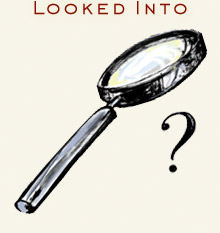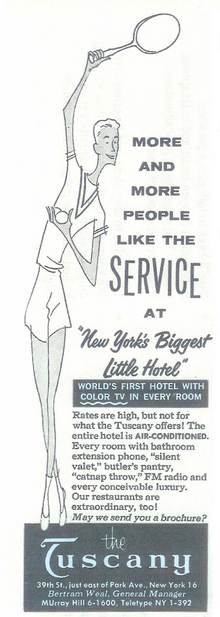Emdashes—Modern Times Between the Lines
The Basics:
About Emdashes | Email us
Ask the Librarians
Best of Emdashes: Hit Parade
A Web Comic: The Wavy Rule
Features & Columns:
Headline Shooter
On the Spot
Looked Into
Sempé Fi: Cover Art
The Lap of Luxury (Hotels), Circa 1958
Filed under: Looked Into Tagged: ads, Benjamin Chambers, Complete New Yorker, fiction, Grover Amen, hotels

Benjamin Chambers writes:
One of the sweeter pleasures of paging through the Complete New Yorker is looking at the dated advertising, especially when a copywriter describes, with a flourish of trumpets, amenities we regard as either standard or puzzling.
For example, if you’d been looking for a quiet, upscale hotel in 1958, you’d have done well to choose The Tuscany on 39th Street. I know, because I came across an ad for it while reading a sweet-but-forgettable memoir by Grover Amen in the June 14 issue of that year. (I’ve displayed the ad here for your viewing convenience, much as The Tuscany’s staff would have turned down your bed at night.)
How could you beat a hotel that was the first in the world to have color TVs in every room? Plus, each room had FM and AC, and every guest could count on finding a phone extension in the bathroom: all items at least as breathtaking, apparently, as its rates.
So what else would you get for your money? A “catnap throw†(pillow), butler’s pantry (a small staging area in which to store plates, glassware, and silverware), and a “silent valet†(a rack on which to hang your clothes).
All part of a strategy, it would appear, to net readers of The New Yorker who wanted class, but who were new to travel. These small details imply that prospective guests will be waited on by their own staff of quiet, liveried servants. After all, if one’s room has a “butler’s pantry,†the butler it belongs to has to be there to count the silver, right?
Ah, innocence! Gone now, though I see hotels still advertise silent valets, so maybe we’re still suckers for promises of elegance. But the romance of travel has definitely waned. These days, hotels simply hand over the keys to the mini-bar and don’t even pretend that a genteel staff member will be there to serve you the contents.
Whither The Tuscany? The hotel is still extant, it appears, appropriately upgraded and still advertising a “chenille throw” fifty years later. Imagine all the people who’ve passed through there since (many no doubt loyal readers of The New Yorker).
O, if only those valets could speak!





Comments
I hesitate to confess that I own a silent valet (inherited from my dad). Usually it just takes up space in a corner, without a jacket on its “shoulders.”
Just think: someday someone will mock that W Hotels page by referencing the quaint “dirty martini” and “lattes” of yesteryear….
I’m just stunned that there was ever a time when “rates are high” was an acceptable thing to put in an advertisement.
Good point, Martin. Though I’ve also had the opposite experience: finding ads in The New Yorker for technology way before I’d thought it was current. I recall seeing an ad for a VCR from the late 60s; and more recently, I saw a mid-60s ad for international air travel that had a picture of passengers in first class, with small television monitors mounted between the seats, on the back of the arm rests. Wish I’d known about Emdashes then!
Mr. Service there has impressive legs and feet en pointe; bet he could do double duty as one’s in-hotel pas de deux partner!
Josh - I agree. “Rates are high” sounds amateurish to me, but when I think about it, that sort of awkward honesty was fairly common for the era’s ads.
Emily - I loved the tennis player/dancer. If the hotel actually has tennis courts or a ballroom, there’s no mention of it.
I think a “catnap throw” is a blankie, not a pillow.
Jamie - I’d’ve thought so too. When I think of a “throw,” I think “blanket,” but when I Googled “catnap throw,” the only results that came back were pillows, much like the one I linked to.
Either way, though, you gotta wonder why having a pillow or a blanket in your high-priced hotel room is so special.
I have not actually seen the ads myself, but I recall reading in Ben Yagoda’s book, I think, that the early New Yorker accepted advertising from hotels (in the south) that if you read between the lines, they kept out blacks and Jews. I’m not sure what the language was, something like “for the discriminating traveler”… that would make this one look pretty tame.
Emily mentioned the same thing, Kevin, when I used the word “exclusive” in an earlier version of this post. I think this underscores what I love about this ad: the fact that even its strongest selling points are so tame.
Benjamin: agreed, a pillow or blanket is not very special—it would be like advertising the room has lightbulbs.
But a throw IS a blanket, and there is such a thing as a “throw pillow”—a decorative pillow, as opposed to a bed pillow. Your link shows a pic of a decorative pillow with a cat napping…ergo, a catnap throw pillow.
(Am I annoying, or what?)
Not at all, Jamie. You’re probably right; though it seems plausible that “catnap throw” is simply a shortened version of “catnap throw pillow.” However, I’m probably a victim of Google here. Just because I can get nine hits for “catnap throw” that are all pillows and not blankets doesn’t mean the term is used correctly on those web pages.
I had to laugh at your description of the “catnap throw” I linked to, as it sounds (and is!) so silly. Sort of like having a “silent valet” with a picture on it of the speak-no-evil monkey in livery.
Kevin, I can’t find the page in question in a quick hunt, but I remember that passage on ’50s hotel ads from Ben Yagoda’s book, too. “Restricted” is the main euphemism I’ve seen references to, for both North and South, and probably “exclusive.” (The word appears, in this context, in some of the best zingers in Auntie Mame.) I don’t think this ad is implying anything untoward, though.
Another ’50s tidbit I noticed on a recent rereading of Yagoda’s book: “The next year [1954], following the surgeon general’s report on smoking, the New Yorker stopped accepting cigarette advertising.”
Ah, wait, good old Google Books knows.